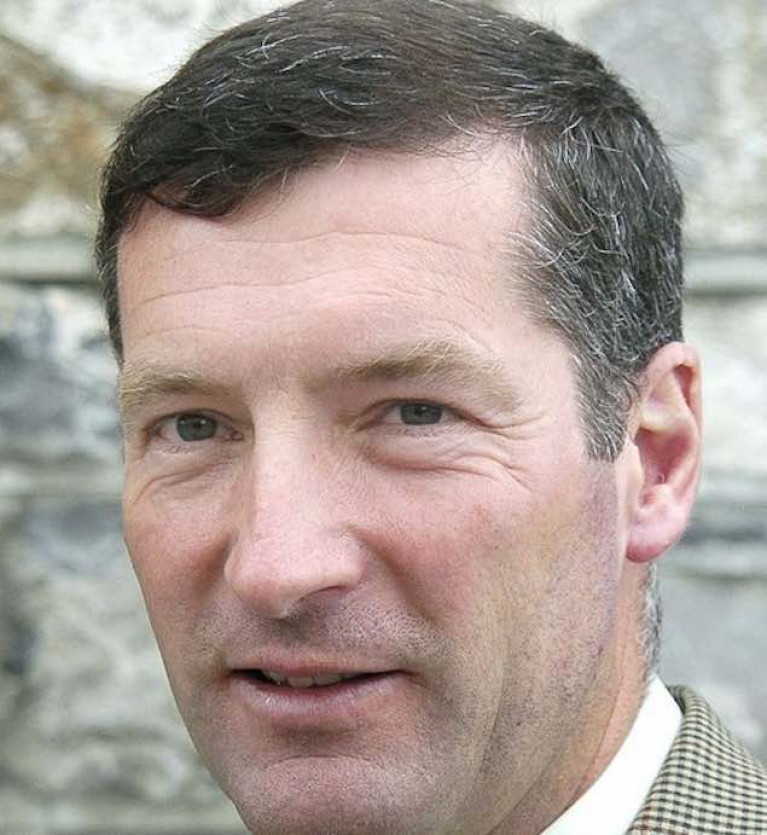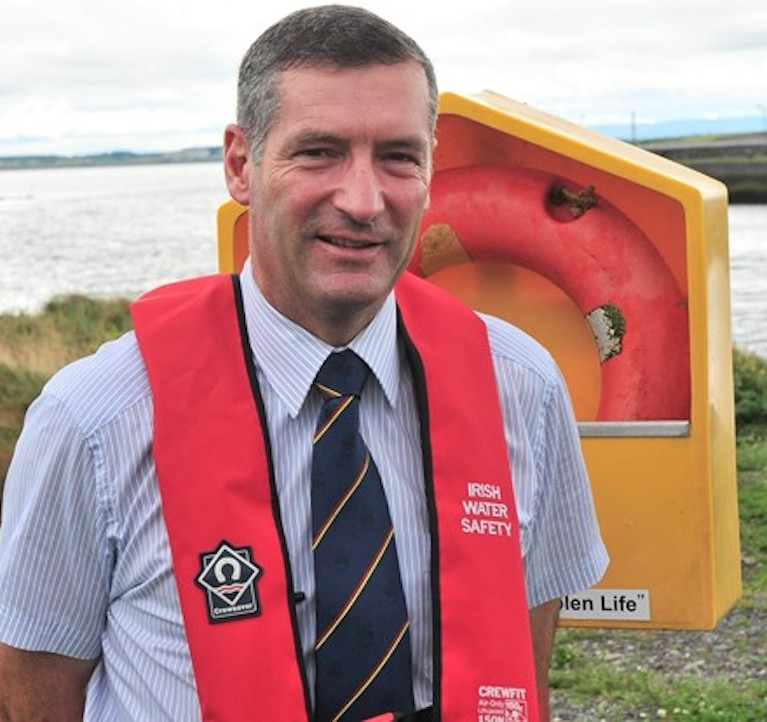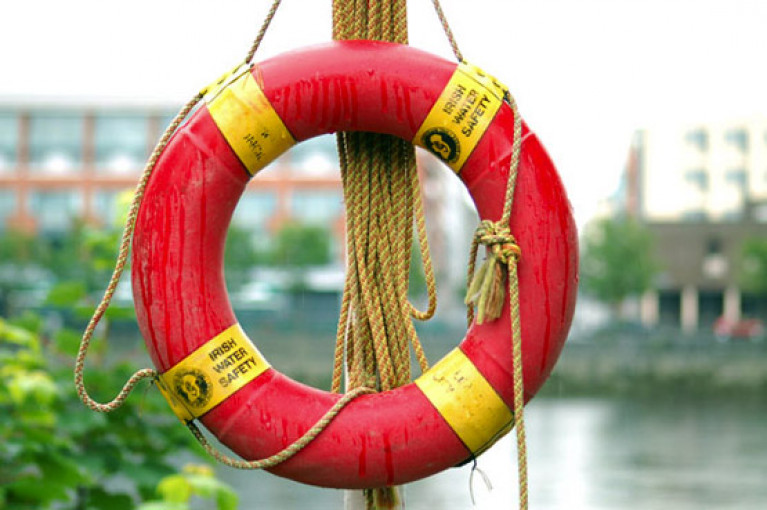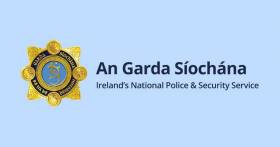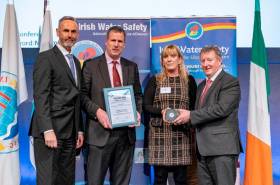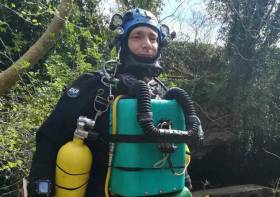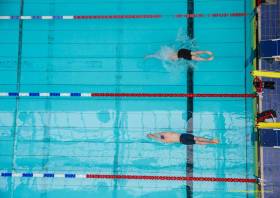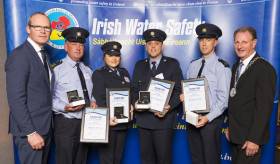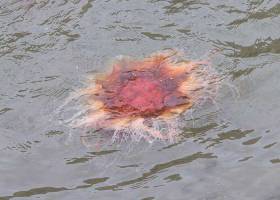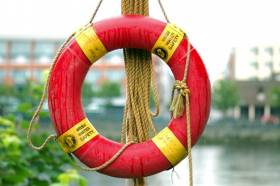Displaying items by tag: Irish Water Safety
Sailing Will Help Deal With the 'Inflatables' Problem
Five local Councils, in cities and counties around the country, are now considering banning what has been termed as the "killer inflatable toys" from local beaches.
This follows the call by the Chief Executive of Water Safety Ireland on Afloat.ie last week for such a ban
John Leech said that, after almost a dozen rescues by the RNLI, Coast Guard, fishermen and members of the public during this Summer, action to protect life had to be taken against "these very dangerous toys." There was a huge response to his Podcast.
This week he told me that sailing was going to help in a campaign to increase safety, particularly for Paddle Board. Amongst the support he has received has been from UK Sailmakers Ireland, formerly known as McWilliam Sailmakers, at Crosshaven in Co. Cork, with an initiative to install warning windsocks on beaches, which Mr Leech outlines in his week's Podcast.
"Sailing has shown how the use of lifejackets and buoyancy aids can be easily and assimilated into enjoying watersports"
A sailor himself and an international racing judge, the CEO of the national water safety organisation says safety level in watersports is at a high level and sailing has shown how the use of lifejackets and buoyancy aids can be easily and assimilated into enjoying watersports.
What is of most concern, he says in this week's Podcast is those to who are inconsiderate of others, such as the demands they make on the rescue services and irresponsible in using the "dangerous inflatables" which have also been the source of criticism from the RNLI and warnings from the Coast Guard.
"They are not suitable in Irish waters," he said. To get this message home, a new educational programme is to be introduced through the schools, as well as the initiative from UK Sailmakers.
The current period of lifeguards patrolling beaches ends on September 15.
"We do not want more dangerous incidents before then," says the Water Safety Ireland CEO. "The response through Afloat has been very impressive and shows strong public support for what we are trying to achieve – safety on the water and the safe enjoyment of being on the water."
Listen to the Podcast here
Water Safety Ireland Chief Wants a Ban on Inflatable Toys
It has been called "the summer of inflatables" by rescue service personnel – the number of emergency calls to adults and children using what have been described as "killer" or "dangerous toy boats."
Now, in an interview with Afloat, the Chief Executive of Water Safety Ireland, the statutory national water safety organisation has said he would welcome them being banned from beaches around the country.
This can be done, CEO of Water Safety Ireland John Leech said, by local authorities and politicians who are members of them using bye-laws to control local beaches.
Several local authorities are understood to be considering such a ban.
Mr.Leech said there is a lack of understanding by the users of these inflatables about the difference between offshore and onshore breezes which is crucial to safety.
John Leech said that this year because most Irish people were not holidaying abroad where they may have used these inflatables, this lack of understanding that conditions on Irish beaches would be different to those abroad, where breezes would blow back onto beaches whereas in Ireland they blew out to sea, was crucial to safety.
He said there were warnings on inflatable water toys when they were manufactured in European countries, but not when they came into Ireland from other countries, such as China.
In this week's Podcast interview below, he distinguishes between "inflatable toys" and stand-up Paddle Boards which have become popular, are rigid when inflated and recognised under the Recreational Craft Directive.
"We have to accept these are not toys. If they are used safely and correctly and if people recognise what the wind direction is doing there should not be an issue with them as long as people wear buoyancy aids and carry some means of communication so that if they do get into difficulty, they can call for help," the CEO said.
Listen to the Podcast below
Water Safety Ireland has warned that children are at greater risk of drowning during the current period of Covid-19 restrictions.
The organisation points out that over half a million primary school-age children are confined to an area within 2km of their home.
And in many cases, any number of streams, rivers, canals, ponds, slurry and rainwater collection tanks, bog holes, wells, lakes and the seashore can be found within this distance.
“From our research, six out of 10 drownings occur at inland water sites and eight out of 10 drownings occur close to the victim’s home,” Water Safety Ireland says.
“It is essential that parents maintain constant, responsible and uninterrupted supervision on their children to ensure they don’t gain access to these real hazards.”
The water safety charity added that while children are at home, families can take the opportunity to teach them how to stay safe near water by using the free resources available online from the PAWS (Primary Aquatics Water Safety) programme.
In an emergency, call 112 and ask for the coastguard.
Is Your Boating Equipment Protected? Forcing a Change at Irish Water & The Battle on Dalkey Island
Thefts of outboard motors and break-ins to boats on moorings were prevalent a couple of years ago. My own boat suffered nearly €6,000 of damage and theft when it was broken into on the mooring at Crosshaven in Cork Harbour during that spate of robberies. An alert, dedicated Garda detective in Cobh on the other side of Cork Harbour recovered some of the items when he located the culprits.
"This week three outboard motors were recovered in Kinsale"
This week three outboard motors were recovered in Kinsale thanks to a member of the public who spotted two men acting suspiciously near the water’s edge at Scilly. They fled, leaving behind a dinghy with three outboard engines in it. Gardai, called to the scene, discovered that attempts had been made to remove engines from two other boats in the harbour area.
"Garda advice is to lock-up your equipment"
That has led to a timely reminder from Gardai who observed that the boating season seems to be starting earlier ever year, urging owners to protect their equipment. Some owners told me after my boat was broken into, that they leave their hatches unlocked on moorings to avoid any break-in damage, but I wonder what about equipment aboard cruisers? The Garda advice is to lock-up and mark your electronic and other equipment. Use your Eircode or some other marking that cannot be removed and take a photograph of the equipment and its marking.
Good advice….and that was one of three stories which stand out for me this week ….. The name change forced on the organisation which has done great work in water safety is another and then there is the battle on Dalkey Island off South County Dublin.
Forcing a Change at Irish Water
John Leech, a well-known and experienced race officer and sailor, who is also Commodore of Lough Derg Yacht Club, is Chief Executive of Irish Water Safety and very devoted to the protection of life in the water…. He told me this week that his organisation is changing its name and that is all because of Irish Water.
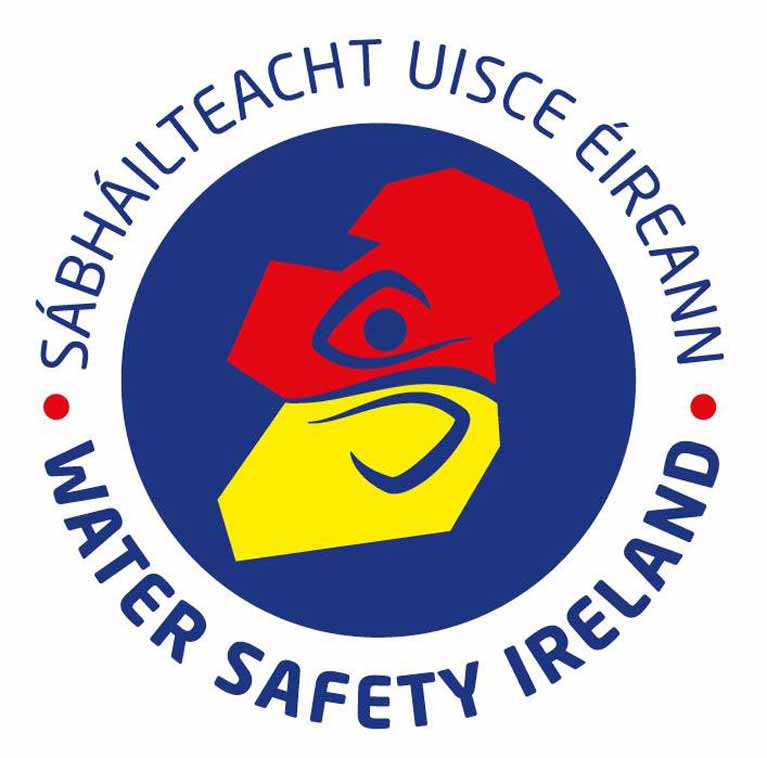 Water Safety Ireland's new logo
Water Safety Ireland's new logo
“Since ‘Irish Water’ was established in 2013, it has caused Irish Water Safety considerable difficulty. Some members of the public get confused and believe we are “Irish Water. We can take up to 15 or 20 phone calls a day from angry and frustrated members of the public who have water supply problems. As a result of this confusion, we requested to our partner Department, Rural and Community Affairs that our name be changed to ‘Water Safety Ireland’.”
• Listen to John Leech on the Podcast below as he explains this.
The Battle on Dalkey Island
So, onto Dalkey Island where BirdWatch Ireland and the Royal Society for the Protection of Birds, are currently baiting rats under the EU-funded Roseate Tern LIFE Programme to protect seabirds. It’s not the only island on the East Coast which has a problem with rats and funding to remove them hasn’t been easily made available.
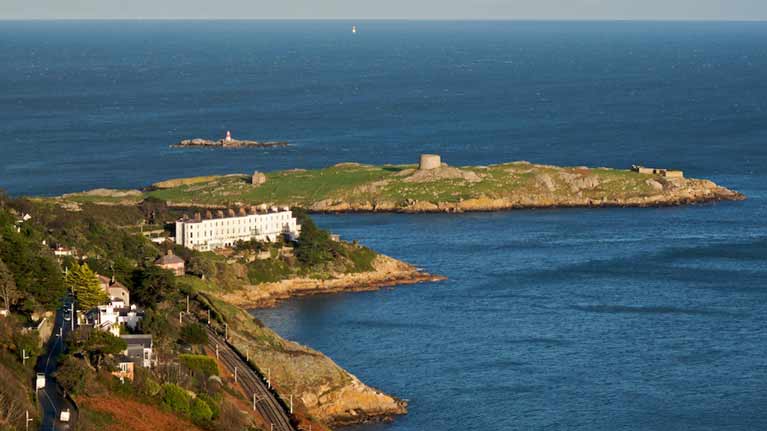 Dalkey Island viewed from Killiney Hill Photo: Wikipedia
Dalkey Island viewed from Killiney Hill Photo: Wikipedia
“If we can keep this island and its satellites rat-free, then other burrow-nesting and crevice-nesting species could potentially settle there,” Dr. Stephen Newton, Senior Seabird Conservation Officer at BirdWatch Ireland, told me on my radio programme, THIS ISLAND NATION and added:” Who knows, we might even one day have Puffins nesting on Dalkey Island?” Non-toxic bait and ‘flavoured treats’ in combination with trail cameras will also be used to ascertain whether the rates have been got rid of.
• The Podcast below has more details of the brown rat menace to inshore islands on the East Coast.
IWAI Receives National Irish Water Safety Award
The Inland Waterways Association of Ireland (IWAI) was honoured this week at the Irish Water Safety National Awards.
The Community and Social Responsibility Award was in recognition of the work by the association and its members in supporting Irish Water Safety’s community work and water safety in general on Ireland’s inland waterways.
The award was presented at Dublin Castle on Thursday 29 November by Seán Canney, Minister of State at the Department of Rural & Community Development.
IWAI president John Dolan, speaking after the presentation, noted that it was a great honour for him and honorary secretary Kay Baxter to receive such an award on behalf of all IWAI members both past and present for their work in this area.
Dolan also stated that he felt privileged and humbled to be present with so many other voluntary organisations, individuals and members of the rescue and security services who have given so much.
That includes those receiving Long-Service Volunteer Awards for teaching swimming, water rescue and survival skills in communities nationwide, and the rescuers who received recognition with the Just in Time Rescue Award in appreciation for saving so many lives in the past year. Irish Sailing also received an award for its support of Irish Water Safety's communuty work.
Echoing the minister’s speech at the awards, the IWAI agrees that it only takes seconds for tragedy to strike and this can so easily be avoided if people learn about the hazards and take responsibility for their own safety, including wearing lifejackets when on or near the water.
The IWAI is a voluntary body representing over 3,500 enthusiasts, with 23 branches across the island of Ireland.
Irish Water Safety Honours Clare-Based Thai Cave Rescuer
#Diving - Irish Water Safety has honoured cave diver Jim Warny for his role in the rescue of the Thai football team earlier this year.
Warny also gave a presentation on the Tham Luang rescue operation at the IWS conference in Athlone’s Hodson Bay Hoetl yesterday (Saturday 20 October).
Twelve boys aged 11 to 17 and their 25-year-old assistant coach were rescued in early July after being trapped in the northern Thailand cave system for 18 days.
As previously noted on Afloat.ie, Ennis-based Warny was one of the Irish connections in the multinational rescue effort.
And he was one of the many expert divers who carefully guided the boys and their coach out of the 4km of twisting passages and flooded sections in total darkness.
IWS presented Warny with the Seiko ‘Just In Time’ Rescue Award for his contribution to that remarkable humanitarian achievement.
As the Irish Post reports, Warny is teaming with a film producer on a dramatisation of his experience in Thailand as well as cave diving closer to home.
Record turn-out at Irish Water Safety National Championships
County Clare lifesavers emerged as the dominant county despite strong challenges from some of Ireland's fittest Lifesavers competing at Irish Water Safety's National Lifesaving Championships in the University of Limerick this weekend.
The championships attracted a record entry of 327. This annual competition gives the best swimming pool lifesavers in Ireland an opportunity to compete in conditions that Lifesavers can encounter in real life rescue situations.
The sport of lifesaving teaches participants the skills necessary to rescue people in distress in water. Many of the competitors, having worked as Lifeguards in pools nationwide, got their chance to pitch their skills against the finest lifesavers in the country.
The events are varied and challenging with competitors swimming under obstacles, rescuing 'casualties' from the water and skilfully testing a variety of lifesaving skills in the process.
"The strong turnout this year means we can look forward to a steady stream of new lifeguards for Ireland's pools and beaches in the coming years," commented Clare McGrath, IWS Sports Commission Chairperson. "Competitors not only acquire life-saving skills but form enduring lifelong friendships around Ireland and overseas."
The championships encourage people to enrol in one of Irish Water Safety's many courses nationwide in swimming, rescue and lifesaving skills.
The event promotes the fitness and readiness for action of the lifesavers and demonstrates Lifeguard water rescues to the public through a series of competitions based around key lifesaving skills such as swimming, towing, line-throwing and the use of mannikin dummies.
Competing counties:
Donegal, Sligo, Mayo, Galway, Clare, Cork, Waterford, Wexford, Wicklow, Kilkenny, Dublin, Louth
Results:
Junior Boys: 1st: Clare A 2nd: Cork B 3rd: Waterford A 4th: Wicklow
Junior Girls: 1st: Clare A 2nd: Wicklow A 3rd: Clare B 4th: Waterford B
Senior Men: 1st: Clare A 2nd: Waterford A 3rd: Sligo A 4th: Wexford A
Senior Ladies: 1st: Clare A 2nd: Wicklow 3rd: Wexford 4th: Clare B
Masters (male/female combined): 1st: Cork 2nd: Waterford 3rd: Donegal 4th: Wexford
Irish Water Safety Honours Remarkable Rescuers At National Awards Ceremony
Thirty-two lives were saved from drowning through the brave actions of forty-seven rescuers who will receive recognition at Irish Water Safety's National Annual Awards Ceremony at the Print Works Conference Centre, Dublin Castle on Tuesday 8th November, from 3pm to 5pm.
Mr Simon Coveney, Minister for Housing, Planning & Local Government will present the "Seiko Just In Time Rescue Award" and other awards to rescuers in appreciation for saving so many lives. Minister Coveney said 'I am delighted to be involved in this year's Irish Water Safety Awards Ceremony. It is an issue that I care deeply about and it is an honour to pay tribute to the courageous and deserving award winners.'
"Tragically an average of 133 people drown in Ireland every year," commented IWS Chairman Martin O'Sullivan, "and although that's 133 too many, the figure would be even higher but for the dramatic efforts of these individuals who saved others from drowning and the ongoing work of volunteers teaching swimming and water rescue skills."
"Complacency around aquatic environments is simply not an option", remarked Mr O'Sullivan, adding that "thirty children aged fourteen and under drowned in the last ten years, reflecting the importance of constant uninterrupted child supervision. The work of our volunteers in teaching and assessing Lifeguards pays dividends at our waterways every year, reflected in the fact that Lifeguards rescued 649 people from drowning nationwide this summer and reunited 662 lost children found wandering near water."
"I appeal to all adults to make themselves more aware of the dangers in, on and around water", continued the IWS Chairman. "It only takes seconds for tragedy to strike and this can so easily be avoided if people take responsibility for their own safety by learning about the hazards. I ask that people encourage friends and family to read Irish Water Safety's guidelines at www.iws.ie so that they have the knowledge, skills and attitudes necessary to avoid becoming a drowning statistic. Drownings can happen quickly and silently so it is very important that people take training before pursuing aquatic activities."
Representatives from the Irish Naval Service will also receive rescue awards for saving thousands of migrants in the Mediterranean whilst on humanitarian missions. Long-Service Awards will also be presented, recognising 1,510 years of personal service of 82 Irish Water Safety volunteers for teaching swimming, rescue and water survival skills in communities nationwide.
SEIKO Just In Time Awards & Rescue Appreciation:
Presented to those who came to the assistance of person(s) in difficulty in water and in danger of drowning.
1. Incident occurred in Galway - Alan Herdman (Kildare) & Neil Gibson (Dublin)
On the 15th of July 2015, at Rusheen Bay, Galway, Alan & Neil were alerted to a group of children in distress in the water. Alan assessed the situation and went to the aid of a young girl and pulled her onto his board. He then continued to rescue another nearby child, pulling them both onto the same board. He instructed the two children to remain on the board while he swam towards a group of four children and helped them to remain buoyant. Neill then arrived on a stand up paddle board to these four children and gave Alan the board to keep them afloat. Neil swam to the remaining two children still in the water and brought them toward the paddle board, joining the children Alan had rescued previously. They then took all eight back to safety.
2. Incident occurred in Turkey - Sean Thompson (Wexford) & Mollie Tamara Power (Dublin)
In July of this year, Mollie, a member of the 38th Dublin Rush Scouts, and Sean, from the 6th Wexford Sea Scouts, were on holiday with their families. The brave teenagers swam to a local boy's aide and pulled him from the water - even clearing his airways and preparing to do CPR before a nurse took over.
3. Incident occurred in Sligo - Ruth Conlon Oates (Sligo)
On the 15th August 2016, 14 year old Ruth was sunbathing by Ballisodare river when she was made aware of a boy in difficulty in the water. She immediately entered the water and brought the person to safety. Her experience in lifesaving comes from her 'Rookie Lifeguard Training'
4. Incident occurred in Laois - Emily Duggan (Laois)
In May 2011, then 8 year old Emily Duggan noticed her little brother Justin then 5 was sinking rapidly in a septic tank. She immediately grabbed a hurley and went to the aid of her younger brother and pulled him to safety. Emily had completed Irish Water Safety's primary school curriculum, PAWS.
5. Incident occurred in Dublin - Donal Ward (Dublin), Niamh Wrenn (Dublin)
On the 23rd of January 2016, two swimmers got into difficulty in the water at Vico swimming place, Dalkey. A swimmer alerted a group of people about the situation. Both Niamh and Donal took a lifebuoy and went to the scene. One swimmer managed to get out of the water but the second swimmer remained in the water. He appeared very weak and was being overpowered by the waves. It was very windy. On the third attempt with the use of a ringbuoy, Donal and Niamh managed to bring the swimmer to safety.
6. Incident occurred in Cork - John McCarthy (Cork)
On the 20th of April 2016, John was walking with his family when he came upon a woman in distress in the water. He entered the water and upon reaching the woman grabbed her by the arm and pulled her to safety.
7. Incident occurred in Donegal - John Flannery, Martin Treanor & Roisin Treanor (Monaghan)
On the 17th of September 2016 at 6pm, four teenage girls were rescued by a group of body boarders John Flannery, Martin Treanor and Roisin Treanor, after they had got into difficulty while swimming in Bundoran, Co. Donegal.
8. Incident occurred in Longford - Nicole Bohan, Dylan Murray, Kielan McDonagh & Jack Carey (Longford)
On the 3rd of July 2016, Nicole, Dylan, Kieran and Jack were walking along the Camlin River, Longford when they noticed a woman in distress. The woman was unable to reach her child in difficulty in the water but through the brave actions of the four friends working together, the child was saved and brought safely to the riverbank.
9. Incident occurred in Wexford - Laurence Duggan, William Duggan (Wexford)
In August of 2016, brothers William & Laurence Duggan came to the rescue of an 11-year old girl who was stuck in mudflats near the Ferrycarrig Hotel, Wexford. They heard the cries for help and immediately went to the rescue, deploying a life buoy on the riverbank and calmly giving the girl instructions so as not to alarm her further as they brought her to safety. Fifteen minutes later, the area where the child was embedded, was covered by an incoming tide.
10. Incident occurred in Clare - John McDonnell, Sergeant John Casey, Sergeant Marie Crowley (Clare)
On Sunday evening of the 14th of August 2016, Sergeants John Casey & Marie Crowley responded to a call at the Pier Road, Ballyvaughan. A man in a car had entered the water. Both Sergeant Casey and John McDonnell entered the water and brought the man to safety.
11. Incident occurred in Kildare - Gardai John O'Sullivan, Michael Murphy & Kevin Williamson
On the 17th September 2015 Gardai John O Sullivan, Michael Murphy & Kevin Williamson entered the Lake at Ballymore Eustace Road to rescue a female who had entered the water. The female was unconscious and unresponsive. They performed CPR until the arrival of the paramedics at which stage the casualty was transferred to hospital for treatment.
12. Incident occurred in Kildare - Gardai David Salmon & Nathan Conroy (Kildare)
On the 21st of March 2016, Gardai Dave Salmon & Nathan Conroy received a call regarding a woman in distress in the water at Rye Bridge, Kildare. Both Gardai went to the location. Upon observing the woman in distress, they both entered the water and brought the woman to safety.
13. Incident occurred in Wexford - Garda Jarlath Duffy (Wexford)
On the 17th February 2016, Garda Jarlath Duffy observed a man in distress in the water at the River Slaney. The full uniformed Garda entered the water and brought the man to safety.
14. Incident occurred in Dublin - Garda Aidan Kelly (Dublin)
On Tuesday 19th of January 2016, Garda Aidan Kelly of Blackrock Garda Station observed a man fall into the water at Victoria Quay. Garda Kelly responded immediately and went to the aid of the man. After many attempts to reach the casualty with the aid of a lifebuoy, Garda Kelly ran along the river bank, grabbed another ringbuoy and lowered himself down a ladder. With the assistance of members of the public, Garda Kelly managed to pull the man onto the ladder and up onto the bank to safety. The man was transferred to hospital for treatment. *Garda Kelly has Irish Water Safety's Rescue 1 & 2 Lifesaving training from Templemore Garda College.
15. Incident occurred in Tipperary - Gardai Mark Holden, Kieran Hayes, Claire Murphy & Sergeant Kieran O Regan (Tipperary)
On the 17th of August 2015, Gardai, Mark Holden, Kieran Hayes, Claire Murphy & Kieran O Regan, received a call regarding a man who had fallen into the water at New Quay, Clonmel. The Gardai immediately went to the scene. Garda Mark Holden & Sgt. Kieran O'Regan entered the water. The four Gardai managed to bring the man to safety and waited with him until emergency services arrived to the scene.
16. Incident occurred in Sligo -Gary Robertson JIT, Rescue Appreciation - Ciaran Ferguson, Sean Redahan & Michael Treacy
On the evening of the 9th of August 2016, MRSC Malin Head coast guard received an emergency 999 call regarding an upturned boat off Inishshinny island. A lifeboat went to the scene but they were unable to attempt the rescue due to the crashing waves and many loose fishing ropes floating near the casualty. The unconscious casualty was wearing a lifejacket and was clinging onto a ringbuoy. The Rescue 118 helicopter assessed the situation and positioned itself 50 metres away from the scene. The winchman, Gary Robertson, was lowered into the sea. He swam 50 metres to reach the casualty who was unresponsive and his left arm was wrapped around the buoy. Gary proceeded to work on the rescue by attaching double lifting straps around the casualty. Waves continued to crash over them. The winchman signalled to the operator to slowly start winching them out of the water. The fishing ropes attached to both the winch man & casualty were visible and the winch operator stopped the process to allow the ropes to be cut one by one. Both Gary and the casualty were winched into the aircraft.
17. Incident occurred in Donegal - Davitt Walsh JIT, Rescue Appreciation - Stephanie Knox
On the 20th of March 2016, Davitt Walsh and Stephanie Knox were driving from the Buncrana pier when Stephanie noticed a car in the water. The pair immediately ran down to the slip-way where they met a local man who pleaded with them to swim out to the Jeep. Davitt entered the water and swam 40 metres out to sea to reach a jeep that had slipped off the pier at Buncrana. Upon reaching the Jeep, Davitt pulled the baby from the car. He managed to swim and make it back to dry land. Stephanie took the baby and wrapped it up in her coat until emergency services arrived.
Rescue Appreciation Awards:
Mr Norman Griffin (Monaghan)
In April of 1984, Norman was preparing for his lessons at St Davnett's Hospital swimming pool when he noticed a 7-year old boy face down in the water. Norman immediately entered the water and managed to take the boy to safety where he commenced CPR and alerted one of the parents to call for an ambulance. Norman continued CPR until a doctor arrived. The boy was taken to hospital by ambulance and he made a full recovery.
Ms Ciara Murray
In June 2016, Ciara Murray came upon a teacher who had collapsed in the corridor of the school she attends. Ciara immediately summoned help and an AED and successfully managed to keep her teacher alive until the emergency services arrived and took over. The teacher has since made a full recovery.
Sergeant Dermot Monaghan; Gardai Kieran Dempsey, Mary Murphy, Karl Moore, Johanna Connolly, John Glennon, Nicholas Glennon (Westmeath)
On the 22nd of September 2015, Gardai received a call regarding a woman in distress in the River Shannon in Athlone. Sergeant Dermot Monaghan, Garda Kieran Dempsey, Garda Mary Murphy, Garda Karl Moore, Garda Johanna Connolly & Garda John Glennon and Nicholas Keogh - all of Athlone Garda Station - rushed to the location and commenced searching for the distressed female. With the use of a lifebuoy and a fishing boat the Gardai brought the female to safety. The woman was taken to hospital by ambulance where she made a full recovery.
Mr Hugh Long (Dublin)
In Jan of 1983, Hugh Long was driving his Texaco tanker back from a routine trip. While stopped at traffic lights on the Liffey, a woman banged on his window screaming "help, she's drowning, save her". Hugh, a non-swimmer, immediately jumped from his lorry and climbed down a ladder to the river. He attached a rope to the ladder and threw it out to reach the woman. He managed to bring her to safety and he stayed with her until emergency services arrived on the scene.
Irish Navy
LÉ Eithne - CPO ERA Ruairi de Barra
LÉ Niamh - S/Lt Dave McKenna
LÉ Samuel Beckett - Lt Niall McCarthy
LÉ Roisin - PO Mech Dwayne Philbin
LÉ James Joyce - A/Supply Catherine Doran
Lions Mane Jellyfish Appearing on Irish Beaches
The potentially dangerous Lions Mane Jellyfish which is being washed up on Irish beaches can cause anaphylactic shock.
So far this summer the jellyfish has washed up on beaches at Portmarnock, Malahide, Sutton and Bettystown.
The Irish water safety CEO, John Leech, says 'more jellyfish are likely to appear on our beaches in the coming weeks'.
'The sting from these jellyfish can cause anaphylactic shock and we have had a number of people hospitalised as a result of a sting from these venomous Jellyfish', Leech adds.
The sting from their tentacles lasts many days after they have died.
Members of the public should report the sightings of these two jellyfish to the relevant local Authority Water Safety Development Officer here
For those who will be using non-lifeguarded beaches then download information on jellyfish, including a photo ID card and First Aid treatment of stings here
Water Safety Week Urges Prevention Of Summer Drownings
#WaterSafety - Thirty-seven children aged 14 and under have drowned in Ireland a decade - a sobering statistic to note just weeks before half a million children in Ireland will be on summer holidays.
To mark Water Safety Week, running from today Monday 20 to Sunday 26 June, Irish Water Safety (IWS) is appealing to primary school teachers to give children the vital information they need before the summer holidays.
Children are naturally curious about water, therefore parents should check if their local primary school has yet introduced IWS's primary school curriculum that teaches children how to stay safe around water.
Much of the programme is easily delivered as it is classroom based yet many primary schools have yet to deliver this training. With just weeks to go before schools close, there is still time for teachers and parents to teach essential life skills to keep children safe from drowning.
People drown silently, quickly and sometimes in only inches of water. An average of eleven people drowns every month. They can drown beside others who are completely unaware. Children are particularly at risk and need constant supervision near water.
Water Safety Week highlights the risks and the steps that need to be taken to avoid drowning over the summer:
- Swim at lifeguarded zones listed at iws.ie
- Swim within your depth in case of cramp
- Beware of currents that may carry you away from a safe exit point
- Swim in daylight not in darkness
- Pay attention to signs on the beach
- Learn to use equipment before trying it out
- Swim in view of lifeguards and heed their advice
- Learn swimming, survival and water rescue skills
- Avoid swimming in unfamiliar places
- Lifeguards are not babysitters, take care of your child
- Be aware of water temperature to avoid hypothermia
- Swim parallel and close to the shore
- Even if your child can swim, constant uninterrupted supervision is essential
- Never use inflatable toys in open water
- Wear a lifejacket with crotch strap when boating or fishing from shore
- Swim with others, never alone
IWS is also appealing to parents to enrol their children in one of IWS swim weeks at open water venues nationwide. For details visit www.iws.ie.



























